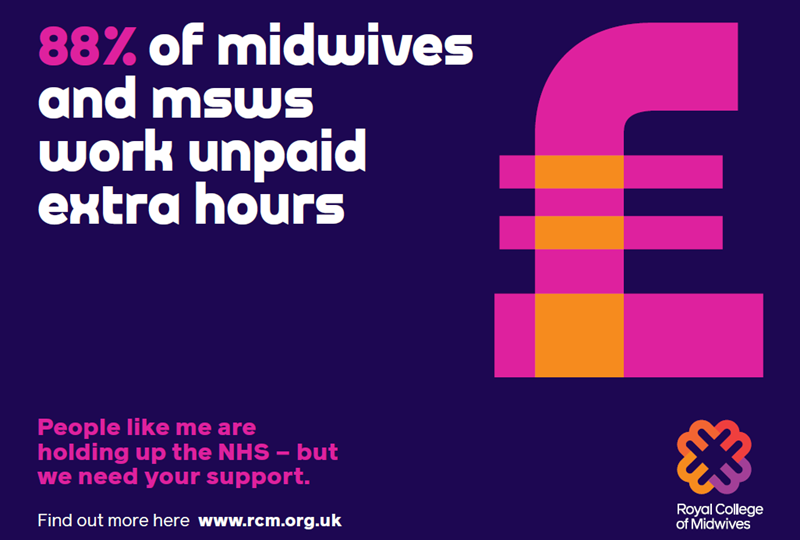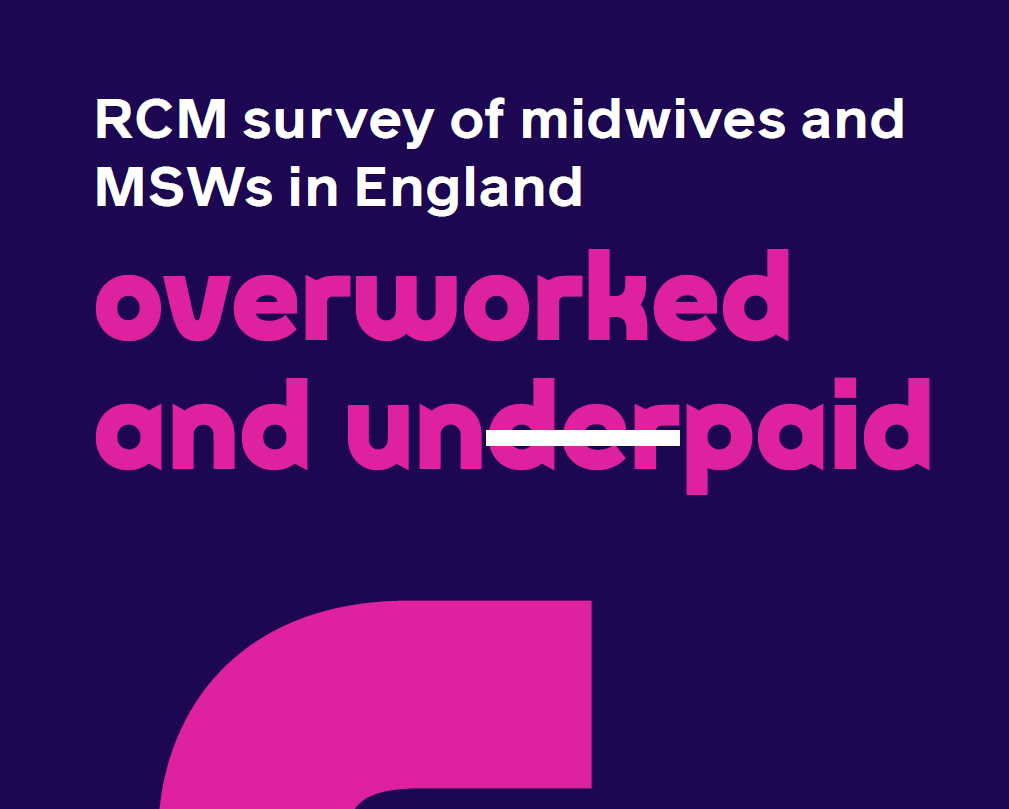RCM survey of midwives and MSWs in England
Overworked and underpaid
The NHS faces a staffing shortage in many areas, but the maternity situation is particularly chronic. Current estimates suggest that the NHS in England is experiencing a shortage of 2,500 midwives. Report after report have made a direct connection between staffing levels and safety, yet the midwife shortage is worsening and we still have no NHS workforce plan to address it. The impact of this is felt by midwives and maternity support workers on a daily basis as the results of the RCM flash survey for members in England reveals.
The results
- Midwives and MSWs are working 100,000 unpaid hours a week to support maternity services
- 88% of respondents worked additional unpaid hours
- 74% of respondents often or always faced unrealistic time pressures and workloads
- 87% of respondents did not feel their workplace had safe staffing levels
- 26% of respondents worked more than five additional unpaid hours
What needs to happen now?
Government inaction has led us to this crisis. Despite acknowledgement by the then Chair of the House of Commons Health & Social Care Select Committee that there is a chronic shortage of midwives and that the shortage jeopordises the quality and safety of care, little has been done to address it.
That same Select Committee Chair is now Chancellor of the Exchequer, Jeremy Hunt, who has it within his gift to ensure that the NHS has the right resources. We recognise there is no quick fix, but there are actions which could be taken now to stem the tide of midwives and maternity support workers leaving the NHS and to ensure women and families receive safe, good quality care. In particular, the RCM wants to see:
- Urgent investment in maternity services and a fully-funded long term workforce plan for the NHS that addresses the current crisis.
- Action to retain maternity staff by actively supporting flexible working, career progression and valuing their contribution fairly, through pay and conditions.
- An end to toxic workplace cultures, by effective action to tackle bullying, discrimination and harassment.

RCM flash survey poster
Download here
RCM flash survey leaflet
Download hereUnpaid hours
In the first week of March 2023, 88% of respondents had worked additional unpaid hours.
In some areas of the country this was more than 9 in every 10 midwives and MSWs, with 92% of respondents in both the Midlands and the South East of England reporting having worked extra unpaid hours.
More than 1 in 4 (26%) respondents had worked more than 5 unpaid hours between 1 March and 8 March. 8% had worked more than 10 unpaid hours.
Burnout and exhaustion
64% of midwives and MSWs said they felt burnt out or exhausted at the end of most or all of their working shifts between 1 March and 8 March.
More than 1 in 4 (26%) of respondents reported feeling burnt out or exhausted at the end of every working shift.
This was highest in the North East of England, where more than 30% of respondents said they always felt burnt out or exhausted after a shift.
Just 3% of respondents said they never felt burnt out or exhausted at the end of their shifts.
Workload
Nearly 3 in 4 respondents (74%) to the survey said they always or often faced unrealistic time pressures and/or workloads between 1 March and 8 March. In the North East of England and London, this was nearly 4 in 5 respondents (78%)
31% of respondents said they always faced such time pressures and/or workloads. In the North East of England and the Midlands this was as high as 35%.
Just 3% of respondents said they never faced unrealistic time pressures and/or workloads between 1 March and 8 March.
Safe staffing
87% of respondents across the country said they did not feel that their workplace was safely staffed in the first week of March 2023. This was highest in Yorkshire and Humber, where 90% of respondents did not feel their workplace was safely staffed.
The RCM has sent media releases on the following regions in England:
Yorkshire and Humbler
East of England
Midlands
South East
London
North East
North West
South West
The flash survey ran from midday on 8 March 2023 until midnight on 20 March 23. It was conducted on Microsoft Forms, and the link to complete it was sent to members by email and social media posts, and further distributed by the RCM’s organisers and activists.
The questions asked RCM members to answer questions specifically relating to their experiences at work in the first week of March 2023 – from 1 March until 8 March.
The survey had 3949 responses in total. 99% of respondents (3,790) described themselves as midwives, and 1% (154) described themselves as maternity support workers.
This crisis in midwifery, and the effect it is having on maternity workers, was evidenced in January 2023 by the results of an RCM survey of Heads and Directors of Midwifery. 94% of respondents said their unit relies on the goodwill of midwives and maternity support workers to deliver safe care, while nearly four out of every five (78%) said it was either difficult or very difficult to ensure staff take their breaks and leave work on time.
From this survey of midwifery leaders, it was clear that most maternity staff work unpaid overtime as a matter of routine.
To get a sense of the current situation on the ground in maternity from the perspective of frontline workers, the RCM ran a flash survey of its members on their experiences of work in March 2023.
Download results from the 2022 NHS England survey.

